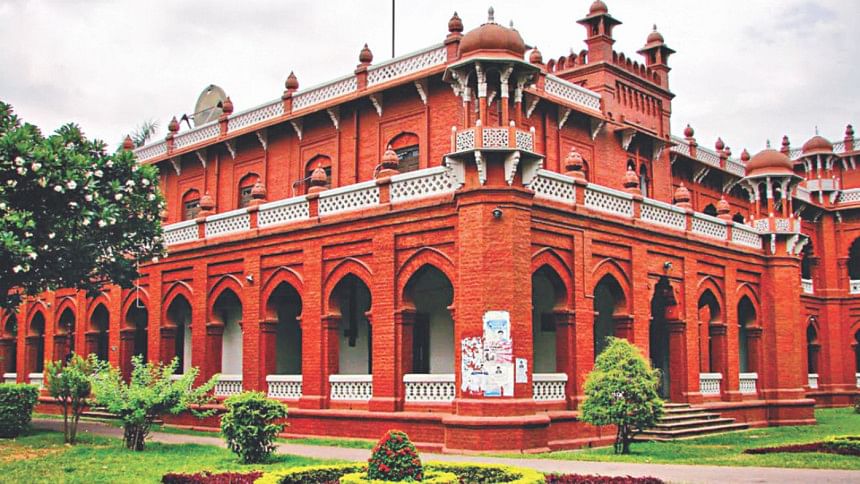Dhaka University, meritocracy and society

Not far is the first day of July 2021 when the University of Dhaka will observe a foundation day marking the completion of a century of its existence as the highest place of academic excellence in this region.
Almost 95 years have passed since the University of Dhaka started its journey on the first day of July 1921 with 3 faculties, 12 Departments, 60 Teachers, 877 Students, and 3 Dormitories for the students.
It is a big university today consisting of 13 Faculties, 80 Departments, 11 Institutes, a good number of Centres , about 35 Thousand Students, about 1900 Teachers, and 23 Halls of Residence (including 4 Hostels).
It behoves me to mention here that at the beginning a particular feature of the university was its non-affiliating, residential-cum-teaching character like that of the Oxford of England. The students belonged to their respective Halls as resident students.
But since 1947, with the creation of Pakistan and Kolkata University remaining with India, Dhaka University assumed an affiliating mandate. Besides, the bulk of the students today are non-resident and attached to the respective Halls. Therefore, Dhaka University does not resemble the “Oxford” make up today. However, in our mind the word “Oxford” also carried a connotation of “quality” that we wanted to see in Dhaka University.

Emerging as an emblem of people's hope and aspiration, the university started contributing significantly— receiving such high esteem, that the then Governor of Bengal and the Chancellor of Dhaka University, Lord Lytton (Victor Bulwer-Lytton was the Acting Viceroy of India in 1926) at the first convocation of the university held on 22 February 1923 said “. . . this university is Dacca's greatest possession, and will do more than anything else to increase and spread the fame of Dacca beyond the limits of Bengal or even of India itself.”
The great standard that the university needed to maintain in its pursuit of knowledge was aptly envisioned by its first Vice Chancellor, Sir P.J Hartag (Philip Joseph Hartog was the Academic Registrar to the University of London) when in the second convocation address he said, “A man may be an excellent teacher of elementary subjects without the power to add to knowledge. But in advanced work I maintain that no one can really teach well unless he has the combination of imagination with critical power which leads to the original production (of knowledge), and for that if for no other reason, a university to be a true university must see that its teachers are men who are also capable of advancing knowledge.”
Where lies the quality of education in Dhaka University today? To answer this is not an easy task. However I may try to intrigue the readers with the following facts.
Noticeably, our admission processes have been highly transparent for decades now, attracting the best talents as students in the university. We are remaining international in orientation with the course curricula and the basic teaching methodologies, though constrained by funds and facilities. Libraries, the repositories of books and journals, do not meet the needs. Laboratories do not have the instruments for supporting good research. Halls of Residence are failing to provide the congenial living environment that the students need for carrying out academic activities. Yet the students are hitting the mark.
But research and scholarship go hand in hand. And the academics need to emphasise on research not only for building their skills but also to enrich opportunities and contribute towards solving the problems and issues of an evolving society. Still, it is also true that scientific research is much too expensive today, and there is not enough fund for doing quality research at Dhaka University. However, there exist some international collaborations accessed by the academics' own initiatives mostly. This has resulted in some good works. Notable are those related to climate and environmental pollutions like the presence of arsenic and other heavy metals in soil, water, plants and trees and their mitigations. The works in biotechnology involving jute genome sequencing and the like are also significant examples. However, while we need to hit stride with whatever little fund we have, all quarters, the government in particular, must come forward in great strength to support research in the university. Otherwise, I am afraid, we would continue to lag behind in the very important aspect of quality research.

It is time to deal with climate change more robustly than before. More so, as Bangladesh is a seriously vulnerable area. And when President John Sexton of New York University on behalf of United Nations Secretary-General Ban Ki Moon invited the Vice-Chancellor of Dhaka University to attend the Secretary-General's Global Colloquium of University Presidents and focus on global climate change, Dhaka University was given a pivotal role to play. Held in November 2007 at the University of New York, which the Secretary General joined for several sessions, the Colloquium gave warnings of serious dangers that are to befall us in the near futures. It concluded with a resonant call that the universities put utmost emphasis to issues related to climate change. And it is especially significant to point out here that Dhaka University was envisaged as one of the “25 Leading Research Universities” around the world to deal with climate issues.
Following the call, Dhaka University in association with the Ohio State University, the World Meteorological Organisation (WMO), the Food and Agricultural Organization (FAO) of the United Nations, the UN Economic and Social Commission for Asia and Pacific (UNESCAP), and the Government of Bangladesh organised the International Symposium on Climate Change and Food Security in South Asia which was held at the University of Dhaka in August 2008. The then President of Iceland (a great climate change link has been ascribed to Iceland), Olafur Ragnar Grimsson who joined the symposium as a front-runner climate activist said, “Bangladesh needs no call to action. More seriously than any other country, it faces disastrous consequences of rising sea levels; it could possibly lose in the coming decades up to one third of the land mass.” In his “One World- One Challenge” foreword he said, “Climate change has altered the way we view the world. The challenge it presents brings countries and regions together in ways we have never known before. The fate of our nations, the future of all, rich and poor, in Europe, in Asia and in every corner of the world, have become closely intertwined”.
The Dhaka Symposium Declaration emphasised on stimulating multi-disciplinary research on climate change and food security in South Asia; initiating and strengthening co-operation among academic and research institutions, international organisations and NGOs; and providing opportunities for strengthening institutions, human resource development and capacity building.
Since there is a sequel, the onus lies with Dhaka University now. It needs to engage
seriously through its curriculum and research activities and create awareness at all levels of society on how to combat climate change. The worst outcome of an immediate action would be that we dealt with the climate earlier than when it was an impending necessity.
Talking about meritocracy—let me now focus on the quality of teachers at Dhaka University. There is no doubt that the most meritorious graduates of the university apply for the teaching positions in the departments and institutes of the university. But whether the authorities in the selection process always proved their adherence to a clear penchant for merit stirred our mind now and again. And there is no doubt that merit has been ignored more than once or twice. Yet Dhaka University has always been centred on by a bevy of good quality teachers. To get from them the best of teaching and research is indeed important. Since the world of learning, teaching and research have been international in scope, and no academic system can exist by itself in the 21st century world, much emphasis should be given so that the university teachers are provided with the benefits and resources keeping in mind the regional and international standards. Today international bodies, everywhere in the world, are relentlessly talking about more funds for education and more benefits to the teachers, for a society to flourish and a country to prosper. This has relevance to Bangladesh despite her limitations and priorities in many more areas. Instead of uplifting the status, downplaying the benefits and privileges will, indeed, impede the instincts of looking forward. We need to look at things with clear eyes and think more positively than what we are doing now.
Maybe I mention about the university teachers giving time for money (as is often said so) in private sector universities located in Dhaka city. But, while Dhaka University has 80 departments and 11 institutes, the private universities have only 10 or so (mostly common subjects). This will make sense that only a small percentage of Dhaka University teachers have such scope. The need of quality education in the private sector universities cannot be overlooked, either. However, the respective departments of Dhaka University must make sure that their teachers are obtaining permission for this extra part time teaching only after fulfilling their commitments to the university.
It is not a bad news that some Dhaka University teachers are giving consultancy services designed for social and national development processes. It is ability that made them the best experts in the country and saved us from depending on foreign consultants involving huge outflow of the hard earned foreign currency.
While focusing on meritocracy, it also behoves me to tell about university leadership attributes. In “Leadership for 21st Century Learning: Global Perspectives from Educational Innovators” edited by Colin Latchem and Donald E.Hanna, July 2001, it has been said that, “Leaders are people who have the capacity to motivate and inspire others to think beyond their current framework to what is desirable, necessary and possible”.
A university leader, besides being pragmatic, must have a clear mind free from obtrusive political motives. Indeed the high esteem of a Vice-Chancellor also goes with her/ his scholarship attributes and a clear penchant for merit in all processes, including selection of teachers for the University.
There are discussions about Dhaka University rankings conducted by different agencies and accreditation bodies. But we need to keep a few things in mind. One important criterion for good ranking is the source of fund i.e. how much a particular university is self sustaining. The “public good” character of Dhaka University has made it mostly dependent on government fund. And because of the nominal fee that the students pay, Dhaka University's own income is negligible. While we look at this as a “service to the society”, it contradicts with the “self sustaining” character of a university. Telling the students to pay more is somehow not realistic. Looks astounding, albeit.
Another very important area is research and publication. I have already mentioned about the constraints here. These and some other preponderances had long restrained us from applying for a rating. And we did not feel the need, either. But those who had done the ratings for Dhaka University, did so on the basis of sketchy information here and there. However it would not be overstating if I mention that Dhaka University is held in high esteem by all great universities in the world. The example of UN Secretary General's Colloquium's views on Dhaka University, which I have mentioned before, is worth remembering. The evidences of good reputation of our graduates studying or working in some of the most reputed universities in the world lend support to what I have said above.
Since its inception, Dhaka University has always been seen as a part of the society, and functioned in tandem with the needs of the society. And holding people's expectations in high esteem, the University of Dhaka contributed immensely throughout our national history. It played the leading role in the Language Movement of 1952 that resulted in the recognition of Bangla as the State Language of the country we belonged to. Dhaka University also played a vital role in our great struggle for an Independent Bangladesh. A great many students, teachers, officers and employees of this university laid down their lives for the independence of the country. There is no other University in the world which had sacrificed so much, and played such great roles. These and many more attributes have given Dhaka University a unique place in history.
The writer is the Former Vice-Chancellor of Dhaka University and a retired Professor of the Department of Soil, Water and Environment.
Contact address: [email protected]

 For all latest news, follow The Daily Star's Google News channel.
For all latest news, follow The Daily Star's Google News channel. 



Comments